Analysts point to logging and mining to explain Solomon Islands unrest
This article was originally published in Mongabay
This article was originally published in Mongabay
In November 2021, Honiara, the capital of the Solomon Islands, was wracked by riots that left three people dead and the city’s Chinatown in ashes.
The unrest was stoked by the prime minister’s decision to end diplomatic ties with Taiwan and instead side with Beijing, stirring up anti-Chinese sentiment, as well as tensions between Guadalcanal province, where the capital is located, and Malaita, the country’s most-populous province but also one of its least-developed.
However, some analysts say the true causes of discontent lie in the cozy relationships between officials and the foreign logging and mining firms that are ravaging the country.
For four days last November, Honiara, the capital of the Solomon Islands, was on fire. Four people died during violent riots, and the city’s Chinatown was torched, leaving hundreds homeless.
Anti-Chinese sentiments had been bubbling since September 2019, when Prime Minister Manasseh Sogavare abandoned the country’s historical ties with Taiwan and switched allegiance to Beijing.
The anger over this political realignment has been linked by some analysts to opposition to China’s state policies of atheism and communism among the predominantly Christian Solomon Islanders, and by others to fears that accepting development aid from China could land the Solomon Islands in a debt trap.
The diplomatic shift also stirred up underlying tensions between Guadalcanal province, where the capital is located, and Malaita, the country’s most-populous province but among its least-developed, whose premier remains a staunch supporter of Taiwan.
However, other observers point to more practical causes for the flare-up of discontent: decades of policies — and official corruption — that have seen little of the islands’ natural resources wealth trickle down to ordinary citizens; and the current government’s cozy relationship with China, the destination for most of the islands’ resource exports.
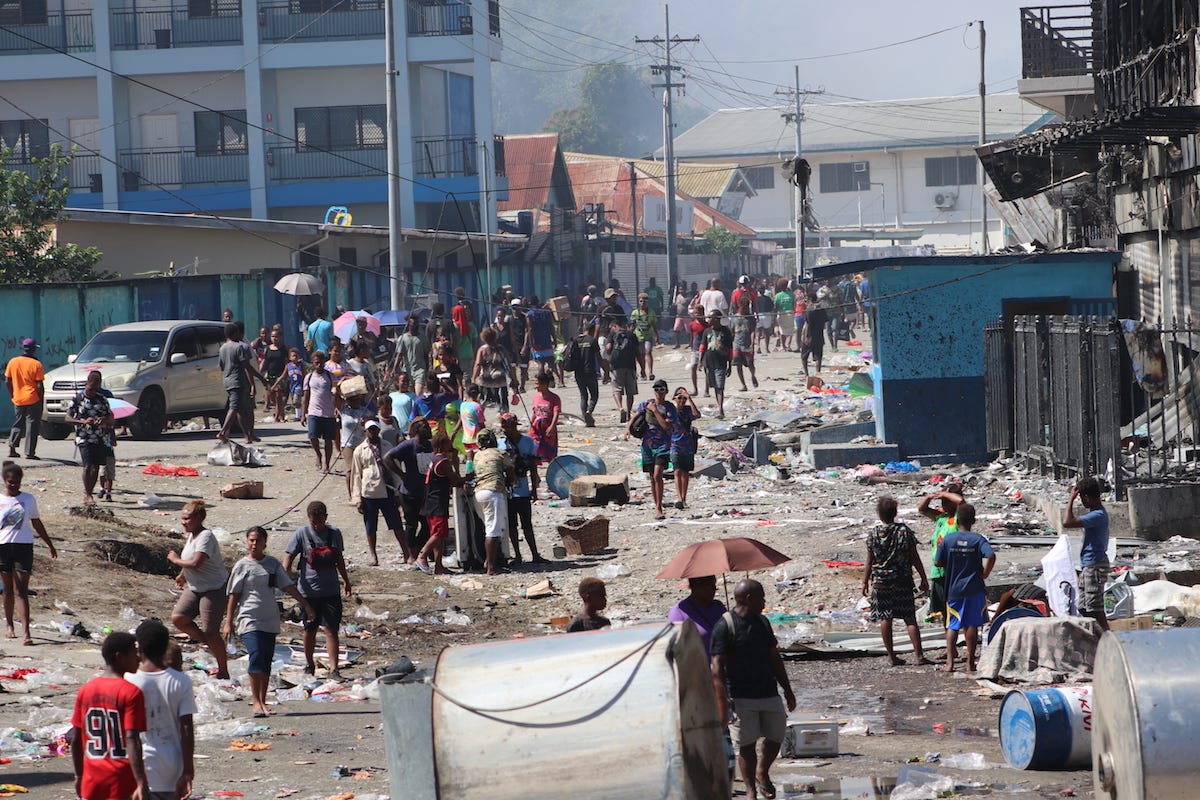
‘It just got out of hand’
Peter Kenilorea Jr., a member of parliament representing Malaita, told Mongabay the Nov. 24-27 riots began after a civil protest demanding the prime minister’s resignation. The protest group, Malaita for Democracy, traveled to Honiara to seek a meeting with Sogavare. Kenilorea said the protest became violent when the PM failed to meet them.
“The protest didn’t go as planned and the spinoff turned into a riot,” he said. “It just got out of hand.”
For many, the scenes brought back memories of unrest between 1998 and 2003, a period known as “the Tensions,” when conflict between residents of Guadalcanal and Malaita escalated into riots and eventually a coup. Then, too, Honiara’s Chinatown was burned by rioters.
According to Kenilorea, the triggers for the 2021 riot were poverty, underdevelopment, and the government’s relationships with foreign state-owned enterprises that have enabled the nation’s wealth to leave the country. “There are people who live around the city who are very marginalized and vulnerable,” he said. “I would pretty much put the riots down to failed policies of the government who are pretty much in the pockets of the loggers. The loggers are very proud of the fact that they run the country.”
Even people who say they don’t believe the recent violence is directly connected to logging and mining policies, such as Honiara resident Glass Ulyssis Yanop, say that culpability for the riots ultimately lies with officials. “The immature and reactive leadership style of our leaders are the instigators of the recent riot,” Yanop said. “It is wrong to blame the tail of a crocodile for killing your dog; It is always the head to be blamed, where the arrogance is.
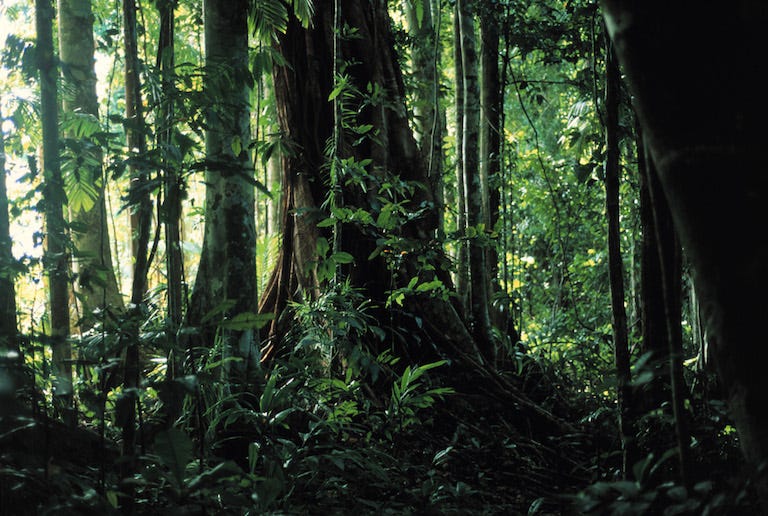
Communal land, private wealth
Around 85% of the land in the Solomon Islands is communally owned, and thus falls under laws that require the consent of every landowner to develop the land. However, the Chinese, Malaysian and other foreign logging and mining firms that dominate the country’s landscape have historically been able to skirt the complex processes of establishing exactly who owns what piece of land, and securing their consent to operate.
Kenilorea told Mongabay that companies are known to create documents that allow a single landowner to sign away the land rights on behalf of the community, who don’t see any of the profit generated from their land.
The country lost almost 7% of its forest cover between 2002 and 2020, most of it primary rainforest. The Solomon Islands, together with its larger neighbor Papua New Guinea, supply more than half of China’s tropical log imports. Its exports to China, in turn, accounts for more than 80% of the Solomon Islands’ logging exports. U.S.-based NGO Global Witness reported in 2018 that trees were being felled on the islands at 20 times the sustainable rate, with a senior campaigner warning that the Solomon Islands’ forests would be exhausted by 2036 if logging continued at this pace.
Andrew Mukai, a lawyer, told Mongabay that loggers and miners have a strong hold over political leaders and officials, and blamed them for the leadership decay in the Solomon Islands: “Having political leaders by their side who can give them tax remissions or duty exemptions as such is part of the relationship. Such favors mean a loss of government revenue to fund services that are of particular importance to the rural and ordinary people of the Solomon Islands. Rightfully, Solomon Islanders are not too happy about the connections and relationships between loggers and miners and the local political leaders.”
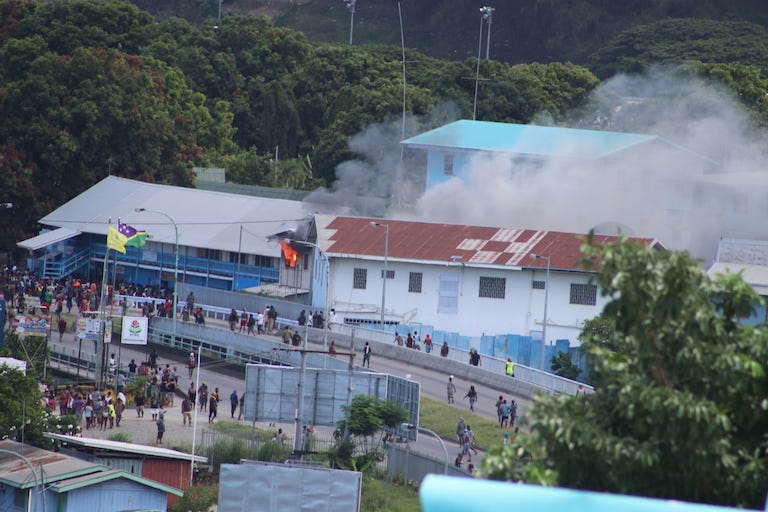
The switch
Prime Minister Sogavare faces serious criticism for abandoning the Solomon Island’s historical ties with Taiwan to build a diplomatic relationship with China. The “switch,” as it has come to be known, occurred in 2019 after Sogavare was elected as an independent candidate. He went on to build a party with independent candidates.
Kenilorea, an opposition MP, alleged that politicians affiliated with the ruling party were supported by Beijing. “In certain quarters it was known that there was funding from Chinese interests to certain candidates, and I think promises were made then,” he said. “As soon as the switch was made, the prime minister went on a state visit to formalize relations and to sign MOUs.”
Upon his return from China, Sogavare held a press conference at the airport to announce that state-owned China Railway had pledged $825 million to revive the Gold Ridge mine on the island of Guadalcanal. The mine had previously been owned by local landowners, who then secured interest from Hong Kong-listed Wanguo International Mining. Wanguo, the project rights holder, contracted China Railway for the redevelopment.
“It was really clear for me that as soon as the switch was made, this was one of the first announcements,” Kenilorea said. Sogavare did not respond to requests for comment.
Bauxite is a growing export from the islands, proving so popular that logging firms are now moving in on the Solomon Islands’ mining industry. In 2019, a bulk carrier loading bauxite ran aground on a reef off Rennell Island, near a UNESCO World Heritage Site, spilling more than 300 tons of heavy fuel oil. The miner involved, Bintan Mining, came under criticism for the disaster. Yet even as the cleanup was underway, the ministry of mines granted the company two more prospecting licenses on the island.
“I’ve heard from colleagues who say they were getting funded from Bintan during the elections,” said Kenilorea, alleging that the profits extracted from the mine on Rennell Island were used to fund his political opponents. He said his opponents claim he won only because their funding dried up during the 2019 oil spill. “They told me straight out that I was lucky the shipment ran aground on the reef,” he said. Bintan Mining did not respond to requests for comment.
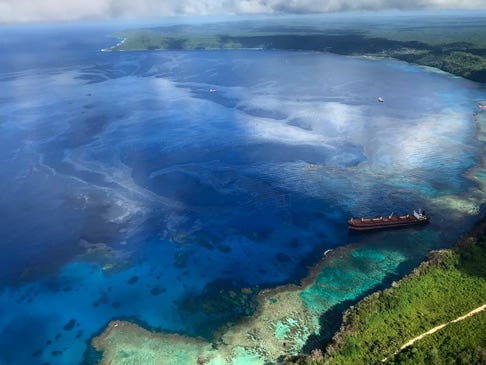
Rich in resources, poor in opportunities
Over the past three decades, the logging industry has become an economic mainstay for the Solomon Islands, contributing 20% of domestic revenue and more than 70% of exports.
But the timber profits have not not been reinvested in the people; the Solomon Islands remains one of the Pacific’s poorest nations, and relies heavily on foreign aid. And an economy dominated by a single industry means few opportunities for workers.
“The poverty here is based on government policy which is pretty much based on logging. That has been their policy — logging, logging,” Kenilorea said. “Every year it’s the same. It brings in money in terms of our revenue, but there’s no other option, so the opportunities are very thin. So the protest is perhaps part of the switch, but the rioting that happened is just a reflection of the poverty that’s around the capital.”
He said this causes huge problems particularly because 70% of the nation’s population is less than 30 years old. “We are resource rich but the opportunities are not there.”
Tensions are also brewing between politicians. The premier of Malaita province, Daniel Suidani, has pledged to refuse Chinese investment in Malaita and describes Taiwan as “a true friend and an old friend.” This goes directly against the national government’s new “One China” policy, which acknowledges Taiwan as part of China rather than an independent nation.
Strict compliance with this policy is described as “the political basis of developing Solomon Islands-China relations” in a readout of a Dec. 16 call between China’s foreign minister, Wang Yi, and his counterpart in the Solomon Islands, Jeremiah Manele. The readout, prepared by China’s Ministry of Foreign Affairs, reports Manele as having said “It is the responsibility of Solomon Islands side to make all efforts to protect the safety and legal interests of the Chinese citizens and Chinese-funded organizations in Solomon Islands.”
Sudiani’s public intransigence has put him at loggerheads with Prime Minister Sogavare. In late October 2021, Sudiani faced a motion of no confidence in the Malaita provincial assembly. But after 40,000 Malaitans descended on the provincial capital, Auki, in support of Sudiani, the motion was withdrawn.
Members of the public have been quick to point out that the “switch” has compounded the Solomon Islands’ material inequality by inviting foreign state-owned enterprises to benefit from its vast resources.
Church leader Judah Suimae said the logging and mining industries remain inaccessible to local residents: “The nation’s switch to China has reinforced Chinese companies’ iron first over the logging and mining industries. Definitely in my opinion dirty money from the industry paid for the loyalty of MPs to remain with the government. These industries will always be allies to the government, for better or for worse.”
Kenilorea told Mongabay he worries that unrest will break out on the streets again when the Australian forces sent to help quell the riots leave the islands. “We will need a political solution before things settle down. Logging has been number one for us for a long time and it hasn’t cured any of our ills in terms of economic development.”
He said loggers have bragged about having the government under their thumb: “They say: ‘The next government’s our government anyway. We run this country.’
“We’re stuck in a cycle we can’t seem to break out of.”
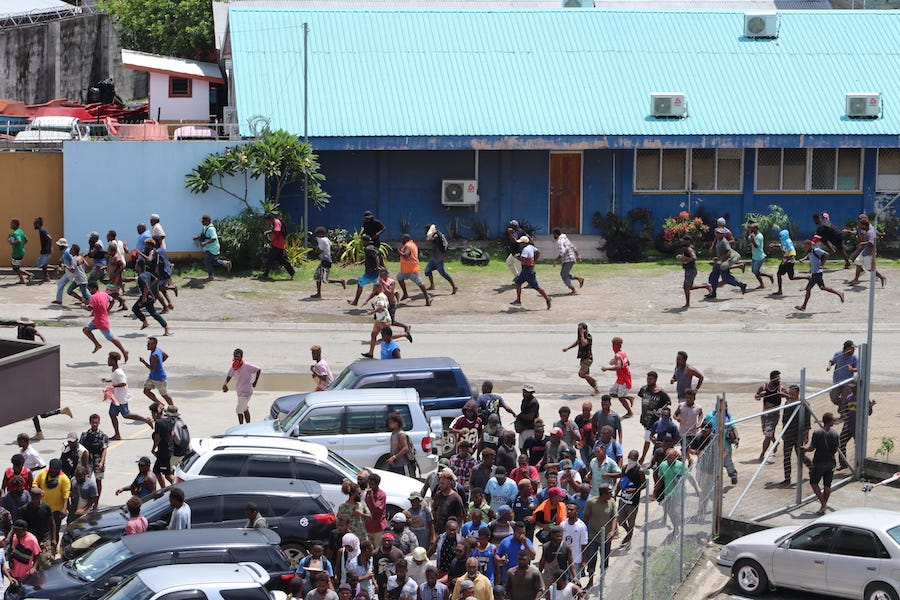
Banner image: a leaf hut outside the Solomon Islands parliament building burns during the November 2021 riots. Image courtesy of Elliot Dawea.
Elliot Dawea contributed reporting from Honiara.


